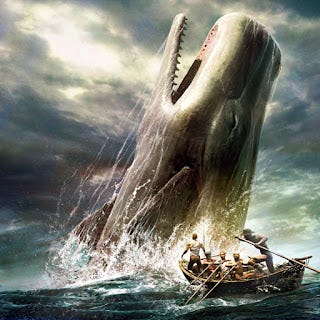There They Blow!
Iyov is my favorite book of Tanach (and I am grateful that it may be studied in Tisha B'Av). It is fascinating, disturbing, challenging, subversive, profound, and it includes the most extensive discussion of wild animals of any book in Tanach!

This past Shabbos, in Netanya, I gave a shiur on Iyov vs. Moby Dick, which I will also be speaking about this coming Shabbos at Young Israel of North Beverly Hills. Now, you might be thinking, what does Iyov have to with Moby Dick? In fact, God's speech to Iyov from the whirlwind culminates in an extensive discussion about whales, and Melville actually wrote Moby Dick as a modern repackaging of the Book of Job.
Curiously, this morning I received an email which directly related to one of the themes of my shiur. A reader wrote to tell me about an unfortunate illness from which they are suffering, which has seriously harmed one of their senses. Even more upsettingly, friends are telling him that it must surely be a Divine sign for his having sinned with that sense. The person wanted my help in knowing what to respond.
The answer is that this persons "friends" are doing exactly what Iyov's friends did - and it is something for which God castigates them.
When Iyov's friends first heard of his terrible suffering and went to visit him, they first sat in silence with him for a week. That was the right thing to do, the correct way to show empathy, and they are praised for it.
After that, they went horribly wrong.

When Iyov starts wailing that he is a good person, and he didn't do anything to deserve such suffering, his friends switch from empathizing to making firm theological declarations. They say that he must have sinned, and that's why these things happened to him. God is Just; hence, Iyov must have deserved this suffering.
Sounds like a very pious speech. And yet when God finally speaks from out of the whirlwind, he declares that Iyov's friends were spouting a lot of hot air, and He is furious with them. It's not just that it's utterly insensitive. It's that it's actually theologically incorrect. Iyov had not sinned. Bad things really do happen to good people. It's not that they have secretly sinned, or (as Yosef Mizrachi would say) because they sinned in a previous incarnation. When God appears to Iyov, he does not present any such justifications.
It is true in Jewish theology that suffering might be inflicted as a result of sin. And there might be people - prophets - who can pinpoint which sins caused it. But there is also suffering that takes place without the person having done anything to deserve it. Since that is the case, then to suggest to a suffering person that his sins brought it on is wrong and a sin of ona'as devarim. The Gemara in Bava Metzia 58b explicitly makes that point, stating that when dealing with a suffering person, it is wrong to adopt the approach that Iyov's friends took.
But if suffering does not necessarily happen as a result of sin, then what is the reason for it? The unfortunate answer is that we don't know. Even Moshe Rabbeinu didn't find out the answer. God's speech to Iyov does not give the answer - instead, it is about how to relate to a universe in which the answer is unknowable. But better no answer than the wrong answer, even (and perhaps especially) if it is one inspired by religious zeal.
Captain Ahab was also a man who was obsessed with his spiritual certainties and his holy crusade. He did not care about the price that it would exact on his crew. Ultimately, in his sacred zeal, he ended destroying everyone around him - including himself.
It is not our place to understand the great mysteries of the universe. And when dealing with those who suffer from the turbulent storms that the universe - and God - sometimes throw at us, it is wrong, sinful, and heretical to claim to know God's reasons. Our job is to simply reflect upon how the universe is too vast and grand an existence for us to ever fathom, and to show friendship and support to those sailing through life with us.
See too this post: Theodicy and Idiocy
On another note - for details about the Biblical Museum of Natural History's forthcoming feasts in Israel and Teaneck, see www.BiblicalNaturalHistory.org/feast


